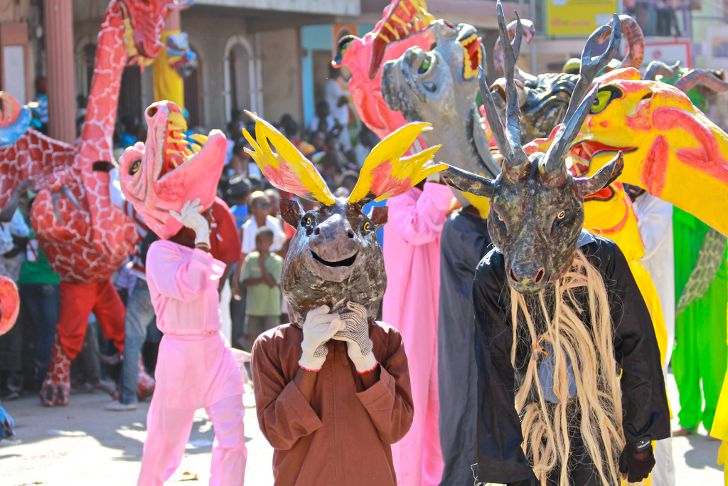The first official public celebration of Carnival in Haiti was held in 1804, following the proclamation of the Haitian Declaration of Independence. Although the festivities were frowned upon by local Protestants who criticized the celebrations for sexual suggestiveness and profanity, Haitian Carnival has grown to become one of the world’s largest events of its kind.
Carnival celebrations are held throughout Haiti but the epicenter of the Carnival is Port-au-Prince, the capital of Haiti and the country’s largest city. Although the festivities known as Pre-Kanaval start as early as January, the main Carnival begins in February and culminates on Shrove Tuesday (Mardi Gras). Celebrations include parades with beautifully decorated floats and performers in vibrant costumes, traditional Haitian music and dances, an annual song competition, and more.
Parade floats in Haiti usually have sound systems set up on trucks to play music to the crowds. The carnival participants often put out comedy plays that satirize political and social topics. Revelers dressed in costumes and wearing masks parade through the streets of Port-au-Prince until they reach the Champs de Mars, a public square in the city center.
Haitian Carnival is known for its music. Local musician perform a wide range of styles including zouk, Haitian hip hop (rap kreyòl), compas (also known as kompa), etc. The Carnival is an important commercial event for local kompa bands and musicians because it gives them the opportunity to perform at large concerts and expand their audience.
One of the highlights of the Carnival is rara. A rara procession is a street parade that incorporates rara music and some elements of Haitian Voudou. Rara musicians play bamboo horns called vaksen, drums and a variety of percussion instruments. Processions also include female dancers and costumed characters who follow Voudou religious leaders. Rara processions begin on Ash Wednesday and culminate on Easter Sunday.

Photo: Lindsay Clark




